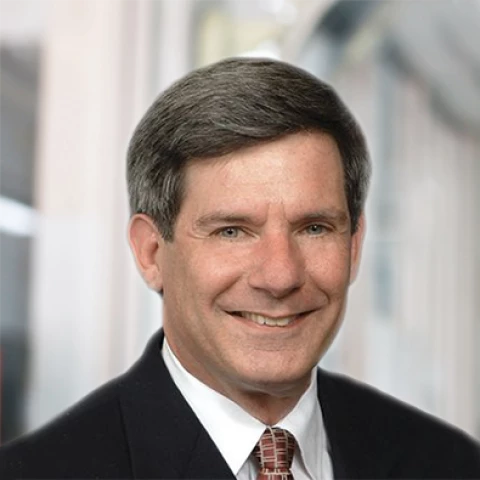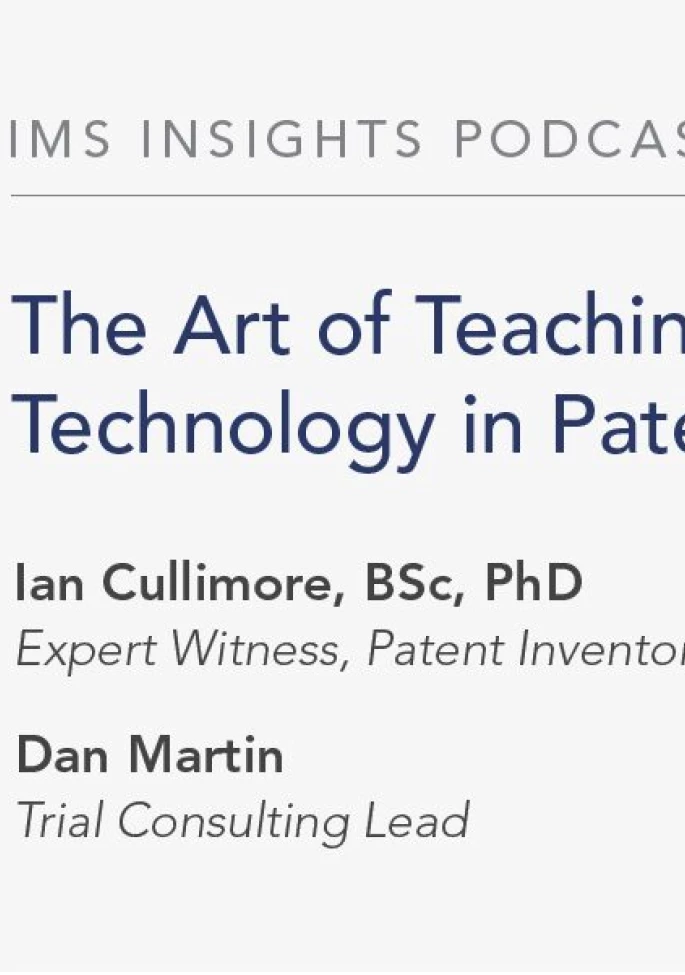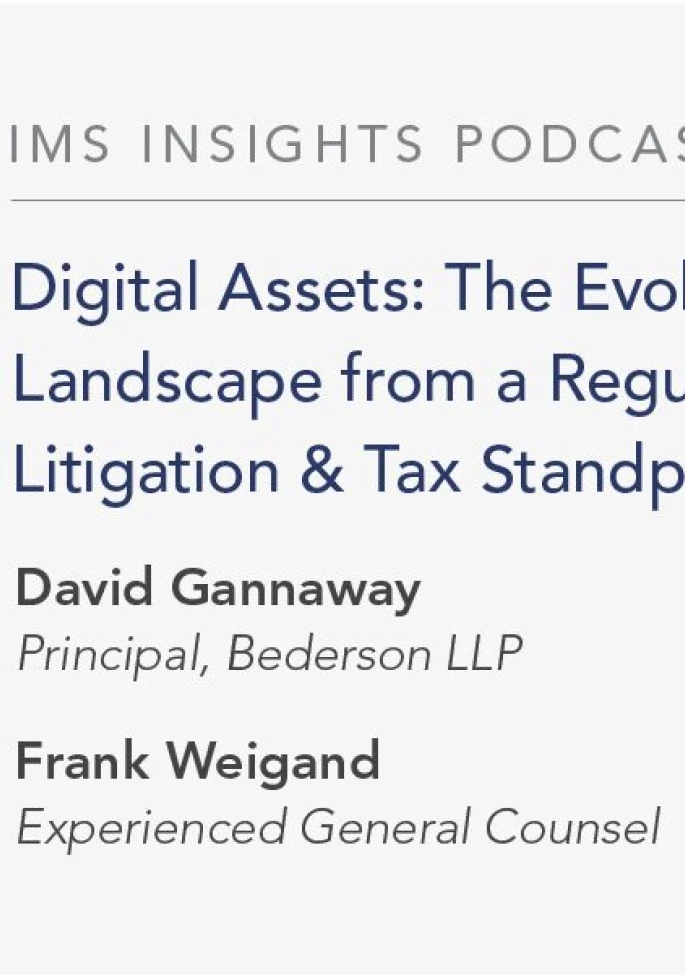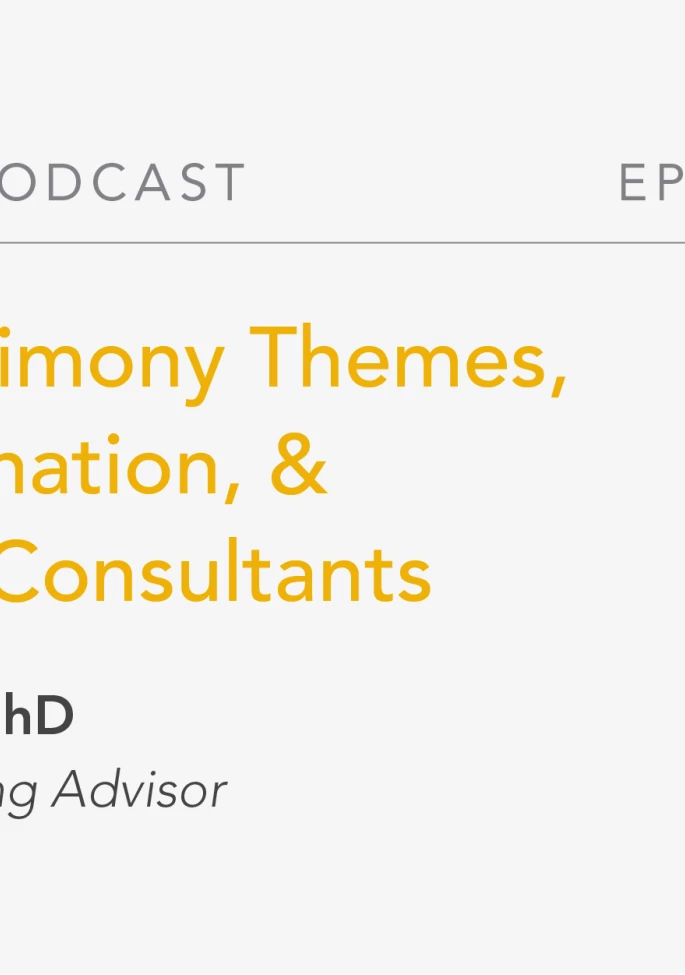In this episode of the IMS Insights Podcast, we speak with economist and statistical expert, Dr. Charles Cowan, about best practices for subject matter experts engaging in litigation as well as litigators working with experts.
Teresa Barber: And Chuck, can you tell me a little bit ... I mentioned earlier when we first started talking, we've worked with you on at least 40 engagements on business matters. You've got a really interesting background as well, and definitely your subject matter in statistics and economics, but expert witness work is different. Can you tell me how you first got involved as an expert?
Charles (Chuck) Cowan: I was working as a director at Price Waterhouse and got a call from Carlton Fields, which is a large regional firm down in Florida, down in your neck of the woods. They had this really interesting lawsuit, but they needed to essentially conduct a survey, which is how it wound up with me because of my background as the Chief of Survey Design at the Census Bureau. I had gone and I was now working for Price Waterhouse, so I started to talk to these attorneys and discovered that what they had and what they described was really an analytic problem and my job was to translate what they wanted to know into, how do we collect the data and prove or disprove whatever the claims are. That was my first introduction into the realm of litigation consulting, and I really appreciated the people I was working with because they were willing to bounce ideas back and forth and hear about other things that they might do that they hadn't thought about. So, it was a good two-way interaction.
Barber: Interesting. Then over the years Chuck, what have you enjoyed the most about working as an expert witness?
Cowan: I think I just alluded to one thing, which is when I'm working with attorneys, the thing I enjoy the most is at the beginning and through the process, discussing different ideas, things that will help support claims or will show that the claims are not supportable. It's the intellectual interaction because I see my colleagues in the legal profession as essentially developing hypotheses and trying to show them, they just don't know that that's what they're doing. So, my job is to take and translate what they're doing and put it into a framework that is supportable. I enjoy thinking about the problem from their perspective, I enjoy thinking about how I can help, and I enjoy the discourse as to what works and what doesn't. And the information I get back during this discourse is, "You can't do that because you have to make a particular presentation on this type of case." Or, "Oh, what I want to do doesn't answer the question because it's a contract law claim." So, I learn a lot at the same time that I'm doing this work.
Barber: Sounds like some intellectual challenge that's enjoyable too.
Cowan: I would say it's also true for all of the people who work with me here. I mean, the reason that they enjoy this is it's something different every day, and it's an intellectual challenge. How do I actually show something or show that it's not true?
Barber: Right, interesting. You mentioned litigators too, the legal team. So for a litigator who is working with an expert witness for the first time, what would be your advice to that person to really have a smooth engagement and to get to that level of putting the pieces of the puzzle together, harnessing that intellectual challenge to advance the case?
Cowan: I think in some cases, I think the answer depends on whether they're dealing with a new expert, one who's not done this before, or somebody who's seasoned. Because if you're dealing with a seasoned expert, they should know enough about the legal background to be able to throw out some ideas and have a good discussion with you. If it's a new expert, then what happens is that part of the work of the litigator is to educate that person to keep their mouth shut. I was a little harsh when I said that but actually most of the time, the biggest problem I see with people who've never testified before is that they want to show how much they know and I'm sure that many of them know a lot, but there's your ... If you're asked a question, yes or no is a fine answer.
Barber: Right. And that was one question I was curious about too for those ... Many experts we see at IMS may be a highly recognized industry authority. Well known in their field, well known in academia, but they've never been retained as an expert before. It is a different thing to be a subject matter expert, versus preparing for work as an expert witness and working with an attorney. Looking back at your very first engagement, what would you have wished you would have known back then or had someone prepare you for? And, what advice would you give to a brand-new subject matter expert who is looking at engaging for the very first time on litigation?
Cowan: That's actually very easy for me to respond to because this is something, I go through with people I hire and I have to go through this with them. I would say first of all that my experience with Carlton Fields continued. I've worked several cases with Carlton Fields, and then subsequently in some of the IMS cases. You talked about cases that are residential mortgage-backed securities cases. What I found was that I was exceptionally well prepared by most of these law firms for what it was that they thought was going to come up, what were the key issues that needed to be addressed? As long as you're preparing the expert, you explain why this is important, what is the focus of your case and how to keep from meandering away from that. You can be incredibly helpful.
Cowan: I would also say that my biggest problem in training people is to get them to answer the question that they were asked. A lot of reports come to me and they always start with, well we did this, then we did that, then we did this, and there's a theory over here. And I'm thinking, "Wait a minute, what was the question and what's the answer?" Then I always find that buried towards the end. So, I rewrite the reports and then explain to people that this is different. There's a specific claim. There's a specific question and the focus is, what's the question and how do I answer that? And, what is the answer? Not so much how do I answer it, but what is the answer? Then later, you can describe how you did it. And everybody wants to show how smart they are, and then eventually get to the answer as opposed to saying, you asked me this, the answer is yes, the answer is no. The answer is, it could be depending on these following three circumstances, and then you show how you got there.
Barber: The methodology, yeah.
Cowan: Yeah. And I would say for litigators, that could be really frustrating for a litigator because somebody just keeps coming and talking or explaining, and there's too much explaining going on. So, the litigator I think can help the expert by explaining to them that it's a simple question, what's the answer? Then once they start to deviate from that, you rein them in, you start over until that becomes a habit.
Barber: Yeah, very interesting. Jargon is another one I want to talk with you about too and knowing that you train professionals coming into Analytic Focus. Subject matter experts, scientists, engineers, we can get very enamored with the jargon of our industries. How important is it thinking from the perspective of an expert witness? How important is it to be able to communicate clearly to an audience who may not be an expert in your field, who may not know these terms CMBS, RMBS? What role does that play in communication?
Cowan: Well, it's very important because you're communicating with a bunch of people who are not familiar with my terminology, and those are my clients. Then over and above that, my client and I are then trying to think about, how do I present this to a judge or to a jury? What I've discovered is that ... I'm told frequently that juries are an 8th grade level and I disagree. I think that most of the juries I've seen have been upper high school, high school senior level. But that still means that I have to explain my terms. Now, I am maybe not the best person to ask this question of because I'm cheating. That's because my undergraduate degree was in English Literature and then I had to go and get a second bachelor's degree in economics because my dad wanted me to get a job. So, I continued on in economics and then in statistics, and I've got all that background. But in terms of presenting and explaining to somebody, I understand the value of keeping it simple and direct.
Barber: Yeah, very good points. And then I have to ask you Chuck, have you had any mentors in your career who especially shaped your path, your direction? Helped you see, "That is actually an interesting field. I'm very curious about questions and curiosity when I study statistics and economics." Anyone who really stands out when you think about those mentors along the way?
Cowan: I think I'd pointed out three. One was in statistics, a guy named Seymour Sudman who was a brilliant statistician, but a very laid-back guy. He was at the Survey Research Lab at the University of Illinois. He was really good at getting me to see the bigger picture rather than focusing strictly on the statistics. We were working on interesting things like counting the number of missing children in the United States, or doing some type of projection based on unusual branches of statistics, and then he ... I was working at the Census Bureau; he was at the university, and he invited me to be a visiting research professor for a year at University of Illinois. And I learned so much in that environment in terms of how to deal with business problems and explain things to people, rather than going completely technical. So even though I talked about the English background, I also learned this by emulating other people who are very good at it.
Cowan: On the litigation side, I'm going to go back to how I first started out, and then how I progressed because I had mentors in two different ways. When I first started out, there was a gentleman named Mark Brown and he was prepping me for depositions. He would ask me a question and I would say, "Yes, and it's because," and he would slap the table to get me to stop talking. He kept doing that until I realized that the answer to the question was yes or no, and all of that embellishment was giving up information that I shouldn't be giving up. I found that to be incredibly valuable so every time I now do a deposition, I've always got Mark sitting at my side slapping the table. But that was early in my career.
Cowan: Then later as I developed and I listened to the question and understood where they were going, so this is a learned skill. You have to listen and think about, well, where are they going to be four questions from now and how can I stop them from getting there? Which is not always what you want people to do as experts but again, a different set of folks at Carlton Fields and then Philippe Selendy while he was at Quinn Emanuel developed what Philippe described as counterpunching. Counter-punching is doing exactly what I said, which is I'm asking a question, but if I give a simple yes or no, I'm just opening up a pathway to pursue, as opposed to anticipating what the question really is trying to get to and counterpunching so that they can't get there.
Barber: Right. Yeah, interesting. Great thought about those mentors along the way too for you Chuck. I've really enjoyed this conversation with you. Definitely a lot interesting I think foresight and insights for our audience on CMBS especially. Is there anything else that you'd like to talk about?
Cowan: I think the only other thing that I wanted to mention is that there's a lot of information that is available on all the topics that we've covered. We talked about rents, we talked about forbearance for renters, we talked about wage rates, we talked about the changing path for businesses as to whether or not they're going to ... Each one of those is a separate topic. What is required is a big picture view that says this is happening, this is happening, this is happening and there's a confluence of these events that are eventually going to affect the economy in a variety of ways, and one particular area that I'm familiar with is a commercial mortgage-backed securities.
Cowan: So as we're discussing this, what I'm really saying is open your eyes, open your ears, think more broadly and that will get you to a place of anticipating rather than reacting. That's my final thought and that is what I do. That's what we do. I mean, I've already been through Bloomberg to see what information is available, how it could be used, how we could do forecasts. The idea is to figure out, well, if I can forecast this, then that just helps everybody figure out what ultimately might happen. I wanted to say thank you to you also. This has been a very enjoyable experience, and it was great being able to talk to you again.
Barber: Yeah, likewise. I really enjoyed it, Chuck.
Cowan: Thank you again, this was wonderful.
Barber: I enjoyed it too. Thank you, Chuck, I appreciate it.
Cowan: Great speaking with you.
Barber: Alright, talk to you soon.






